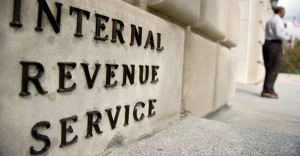Politics and the Pulpit: Part Two: The IRS is Not the Law
 The American people are more fed up with the IRS than ever before, and want to see an investigation into the abuses that have been — and continue to be — perpetrated there.
The American people are more fed up with the IRS than ever before, and want to see an investigation into the abuses that have been — and continue to be — perpetrated there.
This frequent theme of news reports these days intersects perfectly with our ongoing series regarding the position of Churches regarding politics and the pulpit. So many pastors and their congregations are under the impression that they are going to “violate the law” if they distribute a voter guide or preach about the urgent importance of voting pro-life.
Nonsense, and it’s time we start saying so. This series of columns will tell you why.
As we will see in coming weeks, what the IRS restrictions on Churches are when it comes to elections are not so clear in the law, and what is usually described as “legal restrictions” are simply attempts to interpret the law by government agencies — like the IRS — that have little or no accountability, and whose interpretations end up making things more vague than they were before, and chilling the free speech which citizens and Churches enjoy under the First Amendment.
Let’s back up and start at the beginning.
The federal laws of the United States take their origin from two founding documents. The Declaration of Independence expresses the principles at the heart and soul of our system of government. This is the document that identifies the right to life as primary and unalienable, given by God and to be secured by government. The Constitution is the “how to” document, the practical mechanism by which a system based on these principles can work. This document tells us how laws are to be made and what the respective roles of the Congress, the President, and the Courts are. All of these branches of government, and all the laws that flow from them, are to correspond with their foundation expressed in the Declaration and the Constitution.
The federal laws of the United States are organized in the Code of Laws of the United States of America (the “U.S. Code”). It has some 51 sections, called “Titles,” dealing with subjects like the President, the Congress, Commerce and Trade, and so forth. One of those sections, Title 26, is the “Internal Revenue Code” (IRC), which deals with tax issues. Note that the “IRC” is distinct from the “IRS.”
The “IRC” (“Internal Revenue Code”) refers to a set of federal laws. The “IRS” (“Internal Revenue Service“) refers to a government agency, a bureau of the Department of the Treasury, responsible for collecting taxes and for interpreting and enforcing the IRC. As we will see in more detail in further columns, the interpretations put forth by this agency are not law.
It is here that a lot of the battle is being fought for the freedom to speak in politics, and in particular in defense of the right to life. The battle has focused here precisely because of limitations placed on what Churches, organizations, and individuals can say and do regarding elections. And, as we will see, a major part of the battle is to eliminate the confusion regarding what those limitations are, how much weight they really carry, and whether they are in accordance with the documents and principles that are at the foundation of all American law in the first place. Moreover, as far as the Church is concerned, it is crucial to clarify how these limitations correspond, if at all, with the Church’s understanding of her own nature, mission, and ultimate loyalties.
More to come in the next column!
Politics and the Pulpit: Part One: “Uninhibited, Robust, and Wide-Open!”

